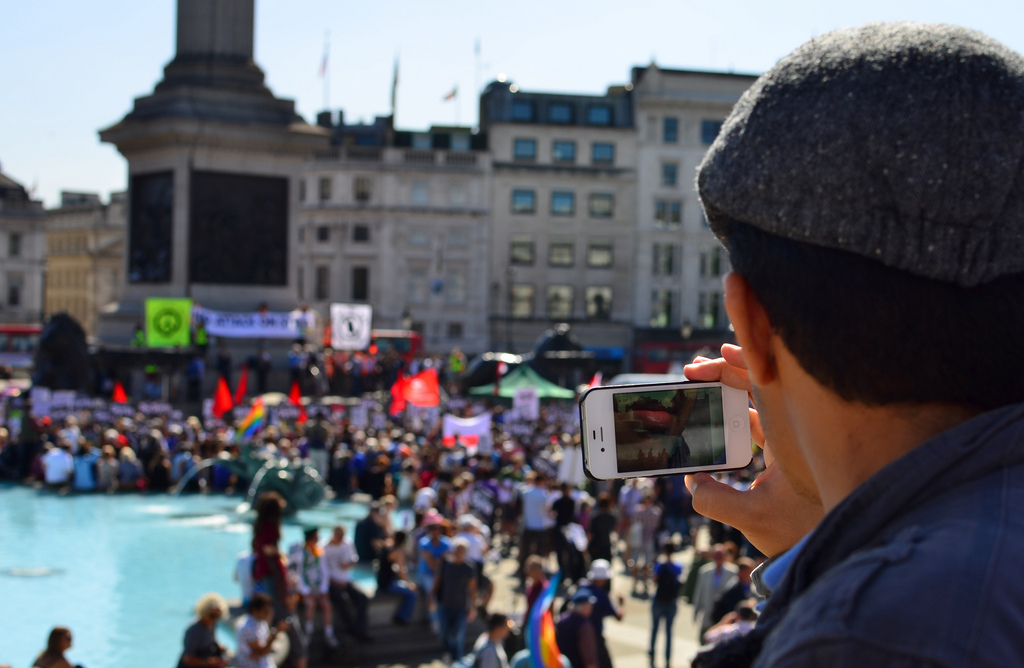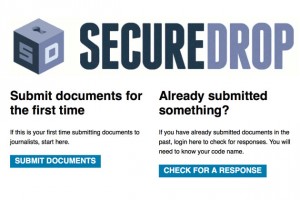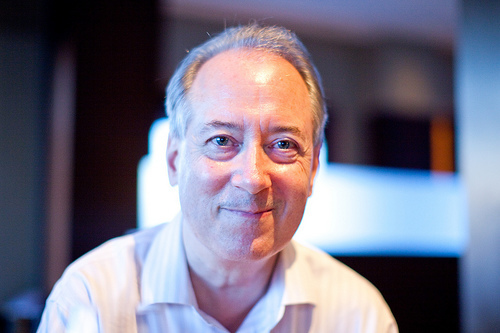Can journalists be activists? A conversation with Dan Gillmor

Photo: flickr/Moreno Berti, CC BY-ND 2.0
Whether journalists can be activists isn’t a new question, but it’s one that’s still being heatedly discussed– especially as digital technologies increasingly make it easy for anyone to create and publish media content. Some say journalism and activism are mutually exclusive because activism, by its very nature, compromises the journalism ethics of balance and neutrality.
Others argue activism is compatible with journalism as long as people are open about their agendas. One of these is Dan Gillmor, a columnist for the Guardian and a university professor who regularly teaches and writes about digital media. He is also the author of several books including Mediactive and We the Media (pdf), which popularized the concept of citizen journalism.
Ahead of a visit to Germany where he is speaking at DW’s Global Media Forum, Dan Gillmor spoke to onMedia about how he defines journalism, uncovering journalism in unexpected places and why he doesn’t trust Facebook.
Dan, is it still relevant today to ask “what is a journalist”?
I think the most important question is “what is journalism” as opposed to “who is a journalist”. A decade or more ago when we started seeing the rise of citizen journalists, it seemed clear we defined a journalist as someone who was getting paid to report. And I thought it was important to define what journalism was and to recognize an ecosystem that was, and still is, getting more diverse and more valuable.
What is journalism then?
It is both difficult and wonderful that we can include many things in the definition. We have to think of journalism as a process rather than an outcome; in the case of journalism, the outcome is information that is useful or entertaining or both. And I felt when we looked at the process instead, it made a much better definition. So I came up with a series of principles. If most of these principles were part of what I was seeing, then I was going to call it journalism.
What are these criteria?
The principles included being thorough, accurate, fair, independent – and here I mean independent thought, not independence of one’s employer and biases but rather looking for things that would challenge the basic assumptions – and transparency. Traditional journalists would probably agree with the first four principles. But because of the principle of transparency, I felt organizations like Human Rights Watch or the American Civil Liberties Union were doing something very close to journalism. After all, most organizations these days have a website and publish their reports, so they are creating media. That is a very exciting development because the ecosystem is getting more diverse.
You have said there is now journalism in places where we never would have discovered it. Can you me give an example?
I certainly wouldn’t have recognized a report from Human Rights Watch as journalism ten years ago – it was only when I realized what they were doing was following these principles that it occurred to me. The only principle I wasn’t sure about was that of ‘independence’ because Human Rights Watch have a certain agenda. But I don’t think their process twists things to meet this agenda. And even if it did, we credit some of the most twisted tabloids as journalism. Human Rights Watch is certainly more independent than tabloids such as Daily Mail and some agenda-driven television and radio (read here about how Human Rights Watch sees its place between journalism and advocacy).
You mean to say, if a political party writes articles transparently, they are producing journalism?
If you leave out the principles of ‘fair’ or ‘independent’, then it is not journalism by any standard. And I can’t image a political party being fair or independent. I would like all five principles to be present but many journalists are not thorough, so it’s a messy definition.
Some say Glenn Greenwald, the former Guardian journalist who broke the Snowden story of the NSA surveillance, is not a reporter, rather he is a liberties activist. What do you think?
I think that is partially mistaken. Greenwald is an advocate and a journalist. And there is a long and proud history of advocacy journalism in the United States, starting with the people we called the muckrakers over a century ago, who were very much trying to change society.
Here in Germany, journalists have criticized Greenwald because he has openly spoken of himself as being part of the activist community.
I guess I would ask your colleagues if they consider themselves part of the German community or part of the journalism community. We are all part of communities of various kinds and does that disqualify us from talking about what effects our communities and backgrounds have on us? No one would suggest we shouldn’t write about our country because we are citizens and therefore biased. Transparency solves a lot of these issues. Glenn is certainly independent in his thinking. He has shown himself able to attack people who have been his allies when they disappoint him. I admire him – I don’t agree with everything he writes – but I don’t know many people who do more homework or more digging.
Shouldn’t what Greenwald writes be considered as commentary rather than journalism?
Again, the lines between commentary and journalism are not always clear. The best traditional journalism gives a nuanced neutral presentation of the issues. But that is not always so clear-cut. From who we interview to the documents we look at and what we leave out, those are often agenda-driven decisions even if we don’t realize it. Our worldview is built into everything we do. What some people worry about is letting a worldview totally dominate and never giving time to people who don’t agree. The answer is, if you are a journalism organization and you want to be the only newspaper that someone looks at, you might decide you have an obligation to be as neutral as possible. I would argue in a world where it is increasingly possible to get information from a variety of sources, it is really the job of the audience to take for granted that there are many views and go looking for alternatives and confirmation. That feels to me than like a better answer.
If I was reading one newspaper every day about my community and that was the only source information I could get – which used to be the case – then I would hope the paper is trying to be independent and fair and thorough and accurate. But the more I would get to know the news, I would realize the owner has an agenda and the editor has an agenda. As such, the kind of neutral journalism that people talk about has never fully existed at all. It is a unicorn. And now that audiences have choices, I hope we can let the unicorn fade away.
At the recent International Journalism Festival in Perugia, you were part of a panel talking about the the Snowden effect. Have whistleblowers like Snowden and organizations like WikiLeaks changed the media landscape?
 Sure. WikiLeaks is a journalistic entity. Much of what they do is important, and they are part of this ecosystem, and this is really key to me in thinking about information and media. So I am glad that they are around. Jillian York from the Electronic Frontier Foundation said during the panel, and I agree, that every news organization should have a WikiLeaks-like system to get things from leakers. There is software called SecureDrop, which lets anonymous contributors get documents to news organizations. WikiLeaks showed how things might be done. I don’t 100 percent support everything that they have done but I support them in the journalistic ecosystem very happily.
Sure. WikiLeaks is a journalistic entity. Much of what they do is important, and they are part of this ecosystem, and this is really key to me in thinking about information and media. So I am glad that they are around. Jillian York from the Electronic Frontier Foundation said during the panel, and I agree, that every news organization should have a WikiLeaks-like system to get things from leakers. There is software called SecureDrop, which lets anonymous contributors get documents to news organizations. WikiLeaks showed how things might be done. I don’t 100 percent support everything that they have done but I support them in the journalistic ecosystem very happily.
What does the journalism ecosystem of the future look like?
Journalism is part of a larger media ecosystem. We can see fairly clearly that the tools, the tactics and the techniques of journalism are changing rapidly. But there are some baseline assumptions: anyone with a computer (including those small computers we call mobile phones) using minimal tools can create media, and digital networks are pervasive. This second assumption means that this ecosystem is going to be incredibly diverse, ranging from giant state-supported or corporate media to the individual who witnesses an event, captures it and sends it to, for example, witness.org and helps get the word out. In the case of the people capturing the video, they are not journalists, but they are doing journalistic work.
There are a lot of digital tools such as Facebook or Google out there. Are you worried they will take over what we consume?
What Facebook has accomplished is remarkable from a technical and sociological point of view, and of course as a business. I hardly every use it though because I don’t trust them. They have fairly clear goals: to persuade people to do everything in ways that create data that can be sold or used, and to make Facebook an alternative internet. In some cases, where the data used to surf Facebook is free, Facebook is all people know. Facebook is the internet. Google’s dominance in advertising and their dominance in sheer power of their computing systems and what they know about people is stunning. You can avoid organizations such as Google and Facebook but most people don’t chose to. The search engine I use is DuckDuckGo because they don’t log my data.
Why is that important to you?
I value my privacy and there are principles to uphold. Privacy is essential for all of us. And I would rather pay for things than become the product, which is what these other search engines do. If you are not paying for something on the internet, then you are the product being sold on the internet. I prefer to pay.
How can you convince people to change their online behavior?
When someone says, you have nothing to fear if you have nothing to hide, that is a grotesque lie. In fact, we all have something that can be used against us. There are so many laws that no matter who you are, and what you have done, you have probably violated some law. The increasing moves to store everything we have said and done means people can go back and find something where you have technically broken that law. I don’t expect that to happen but that is how police states start. The other important thing to realize is that pervasive surveillance is harmful in larger ways. It makes people less willing to speak freely, less innovative, less willing to take the kinds of risks we need for dynamic societies. And it is contrary to any common-sense understanding of liberty. People who are being watched all the time are not free in any sense of the word. We have a lot to fear from 21st century Stasi states.
This interview has been edited for clarity.
 Interview by Steffen Leidel, edited by Kate Hairsine
Interview by Steffen Leidel, edited by Kate Hairsine
Dan Gillmor is a professor of digital media literacy at Arizona State University’s Walter Cronkite School of Journalism and Mass Communication. As well as regularly writing for the Guardian, he is the author of several books, including Mediactive. You can follow Dan on Twitter @dangillmor



